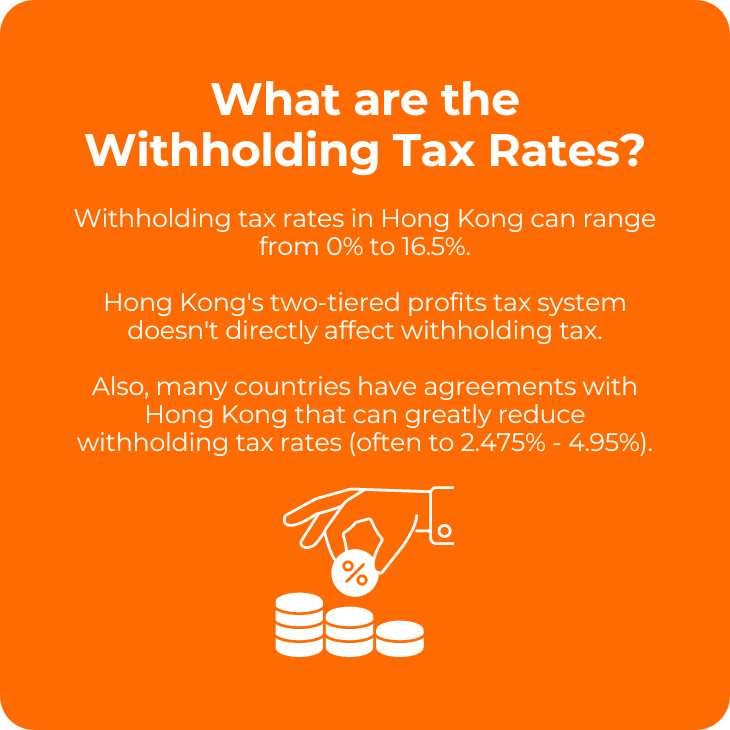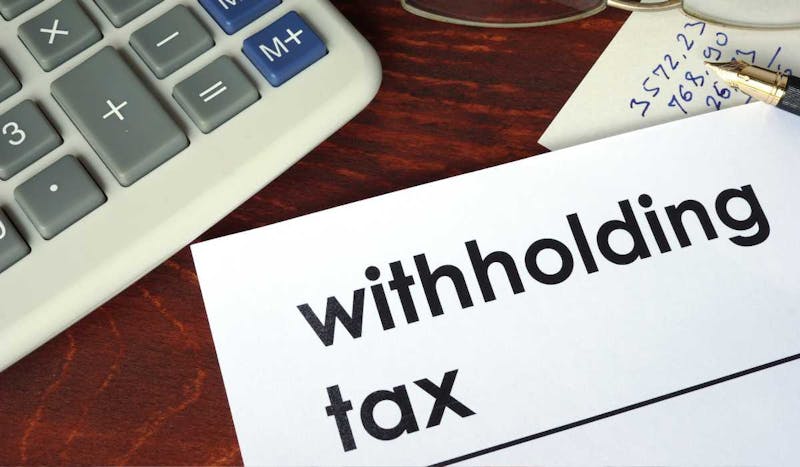Withholding tax rates in Hong Kong range from 0% to 16.5%, influenced by the recipient's residency, income type, and tax treaties.
Types of income subject to withholding tax include royalties, intellectual property payments, and fees for professional or technical services provided by non-residents.
Dividends and interest income are generally not subject to withholding tax in Hong Kong.
Entities must assess withholding tax obligations, determine applicable rates, withhold the correct amount, maintain records, and file tax returns with the Inland Revenue Department (IRD).
Hong Kong is a popular place for businesses because it’s very business-friendly.
But, understanding the tax rules, especially for income from non-residents, can be tricky.
One important thing to know is withholding taxes, which apply when companies in Hong Kong pay non-residents.
What is Withholding Tax?
Withholding tax is a way to collect some taxes upfront on certain types of income.
Unlike typical income tax, where the employer withholds a portion from salaries and pays it to the government on the employee's behalf, withholding tax involves the payer deducting and remitting a portion of the payment to the government on the recipient's behalf.
This deduction happens at the source of the income, as the name suggests.
When a Hong Kong company pays things like royalties or service fees to someone outside Hong Kong, they might have to withhold part of that payment at a specific rate and send it to the IRD.
The amount withheld is usually a percentage of the total payment made in a specific pay period, such as monthly, quarterly, or annually, depending on the income type and the agreement between the payer and recipient.
This withheld amount acts as an advance payment towards the non-resident's potential tax bill in Hong Kong.
Withholding Tax and Income Tax
Withholding tax serves as an initial collection of tax, also known as taxes withheld, which can sometimes offset the non-resident payee's final income tax owed in Hong Kong, depending on the situation.
Your total income tax owed in Hong Kong considers the amount of tax, your filing status (e.g., single or married), and any relevant tax credits.
In certain instances, the withheld amount may cover the entire tax liability, especially for passive income such as royalties, capital gains, and interest.
In other cases, the withheld amount serves as an advance payment toward the total income tax liability in Hong Kong.
If the amount withheld exceeds the final tax liability, the non-resident may file a tax return in Hong Kong and apply for a refund.
Territorial Tax System
Hong Kong taxes only the profits or income earned within its borders, unlike some countries that tax global income.
Withholding tax helps the government get some tax revenue from non-residents who earn certain types of income in Hong Kong.
What are the Withholding Tax Rates?
Withholding tax rates in Hong Kong depend on factors such as the recipient's residency, the type of income being paid, and whether there is a tax treaty between Hong Kong and the recipient's country.
They can range from 0% to 16.5%.
Hong Kong's two-tiered profits tax system doesn't directly affect withholding tax.
Also, many countries have agreements with Hong Kong that can greatly reduce withholding tax rates (often to 2.475% - 4.95%).
There are tools online, like a withholding estimator, that can give you a rough estimate of how much withholding tax you might owe based on your situation.
Non-Resident Companies
- Associates: 16.5% for royalties on intellectual property previously owned in Hong Kong.
- Non-associates: 4.95% for royalties on copyrights, patents, trademarks, and franchises.
- Tax treaty benefits: Can lower rates to 2.475% - 4.95%.
Non-Resident Individuals
- Services: Generally not applicable, except for artistic or entertainment services (16.5% if through a resident agent).

When Does Withholding Tax Apply in Hong Kong?
Withholding tax targets passive income, which is income generated without the recipient being actively involved in a business in Hong Kong.
By implementing this system, the Hong Kong government ensures that non-residents who benefit from the economic activities within Hong Kong contribute to the tax revenue.
Common Examples of Income Subject to Withholding Tax
Intellectual Property
Payments for using intellectual property (IP), such as patents, copyrights, or trademarks in Hong Kong, are subject to withholding tax.
This means that if a company in Hong Kong pays royalties or license fees to a non-resident company or individual for the right to use their intellectual property, a portion of that payment will be withheld and paid to the IRD as tax.
Applicable withholding tax rates:
- 16.5% – Royalties paid to a closely connected non-resident company
- 4.95% – Royalties paid to an unrelated non-resident company
- 15% – Royalties paid to an affiliated non-resident individual
- 4.5% – Royalties paid to an unaffiliated non-resident individual
If a Hong Kong company previously owned the IP, the full royalty payment may be taxed as the company's income.
Service Fees
Fees paid to non-resident companies or individuals for professional or technical services performed in Hong Kong can also be subject to withholding tax.
For example, if a Hong Kong company hires an overseas consultant, auditor, or management company to provide services in Hong Kong, the fees paid to these non-resident service providers may have a portion withheld as tax and sent to the IRD.
In addition to passive income, withholding tax also applies to fees paid to non-resident entertainers and athletes for services performed in Hong Kong.
These engagements are usually short-term and do not establish a long-term business presence in Hong Kong.
As such, the government ensures tax is collected on their earnings through withholding tax.
The withholding tax rate for entertainers and athletes can vary.
Applicable withholding tax rates:
- 10% – If paid directly by the event organizer
- 11% – If paid through an agent
The higher rate accounts for the additional administrative layer and potential income distribution involved when agents are used.
Exceptions to Withholding Tax
Generally, withholding tax does not apply to dividends distributed by a Hong Kong company to its shareholders.
This means that when a Hong Kong company pays dividends to its non-resident shareholders, these payments are not subject to withholding tax.
Interest earned on deposits, loans, or other financial instruments in Hong Kong is also typically not subject to withholding tax.
For instance, if a non-resident earns interest from a bank deposit or a loan given to a Hong Kong entity, this interest income is usually exempt from withholding tax.
Who Needs to Withhold Tax?
In Hong Kong, the responsibility for withholding tax applies to any entity making specific payments to non-residents. This includes:
- Companies: All registered businesses in Hong Kong, regardless of size or industry.
- Partnerships: Any business partnership operating within Hong Kong.
- Individuals Conducting Business: Sole proprietors or freelancers in Hong Kong make payments to non-residents falling under specified categories.
Steps for Withholding Tax

Assess Obligation
The Hong Kong entity making the payment must first determine if withholding tax applies based on payment type and the recipient's residency status.
Determine Rate
If withholding tax applies, the payer identifies the appropriate rate considering the factors mentioned earlier.
Double taxation agreements can significantly lower rates, and finding the treaty rate requires checking the specific agreement between Hong Kong and the recipient's country.
Withhold Tax
At payment time, the payer deducts the designated percentage from the gross amount payable to the non-resident.
Maintaining accurate records of the withholding tax deducted—including recipient details, payment amount, applied tax rate, and total tax withheld—is needed for tax return filing and remittance to the IRD.
File Tax Return and Pay Tax
The Hong Kong entity must file a tax return with the IRD within a specified timeframe (typically one month after the quarter-end) and remit the withheld tax amount.
Even if a tax treaty reduces the withholding tax rate to zero, filing a tax return remains mandatory in most cases. Late filing or payment can lead to penalties.
How to Minimize Withholding Tax in Hong Kong
Understanding Double Taxation Agreements (DTAs)
Double taxation happens when the same income is taxed in two different places.
To avoid this issue, Hong Kong has entered into Double Taxation Agreements (DTAs) with over 50 countries. These agreements explain how taxes should be shared between Hong Kong and those other countries.
Click here for the complete list of Hong Kong’s DTAs.
Why DTAs Matter
Double Taxation Agreements serve several key purposes:
- Prevent the same income from being taxed twice
- Foster cooperation between Hong Kong and foreign tax authorities
- Encourage cross-border trade and investment by clarifying tax obligations
Key Benefits of DTAs
DTAs are designed to protect taxpayers and promote fair tax practices. The benefits include:
- Clear guidance on tax liabilities for individuals and businesses operating across borders
- Tax relief for foreign taxes already paid
- Greater transparency and reduced risk of tax evasion through information sharing between tax authorities
- Clarification of taxing rights between jurisdictions to support smooth international transactions
Who Is Eligible to Claim Benefits Under DTAs?
To take advantage of Hong Kong’s tax treaties, you or your company must qualify as a Hong Kong tax resident.
You qualify if:
For Individuals:
- You live in Hong Kong, or
- You stay in Hong Kong for more than 180 days in a tax year
For Companies:
- Your company is incorporated in Hong Kong, or
- It is managed and controlled from within Hong Kong
Common Methods of Double Tax Relief in Hong Kong
Tax relief can be obtained through either local tax legislation or under the terms of a relevant DTA. The most widely used methods include:
- Tax Deduction: Local tax is charged after deducting foreign tax already paid
- Tax Credit Relief: Foreign taxes paid are credited against your local tax bill
- Tax Exemption: Certain foreign-sourced income is exempt from local taxation
- Reduced Withholding Rates: Preferential tax rates may apply to specific income types such as dividends, interest, and royalties
Need Help With Your Withholding Tax?
Withholding tax can seem difficult, but understanding the basics can help you comply with Hong Kong tax regulations.
If you need help with withholding tax or other Hong Kong business matters, consider partnering with Air Corporate.
From company registration and tax filing to accounting and corporate secretarial services, our team of experts can handle the administrative burdens so you can focus on running your business.
Contact Air Corporate today to learn more about how we can help you make a successful venture in Hong Kong.






